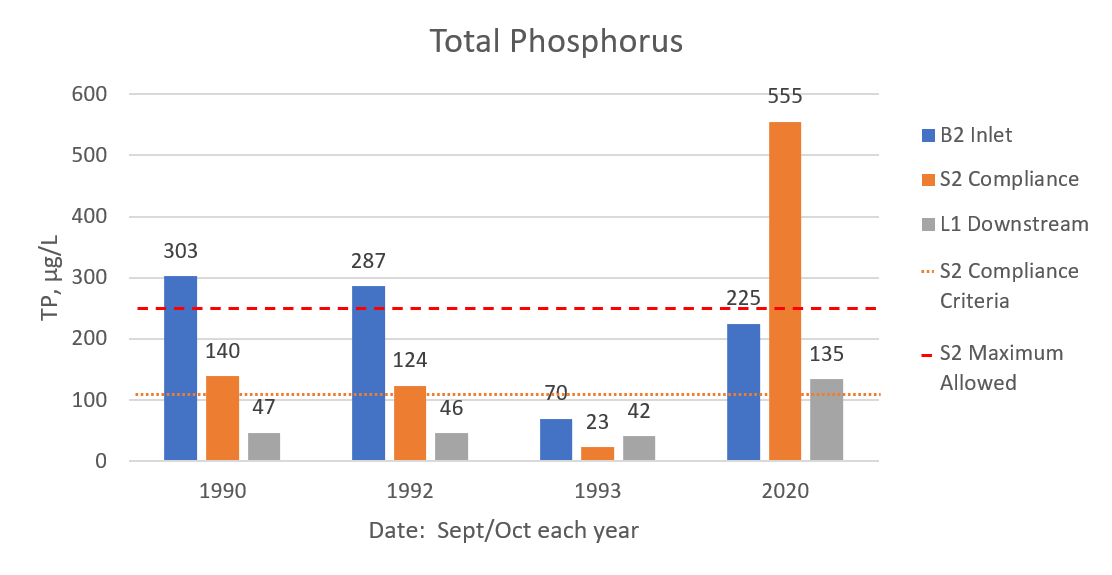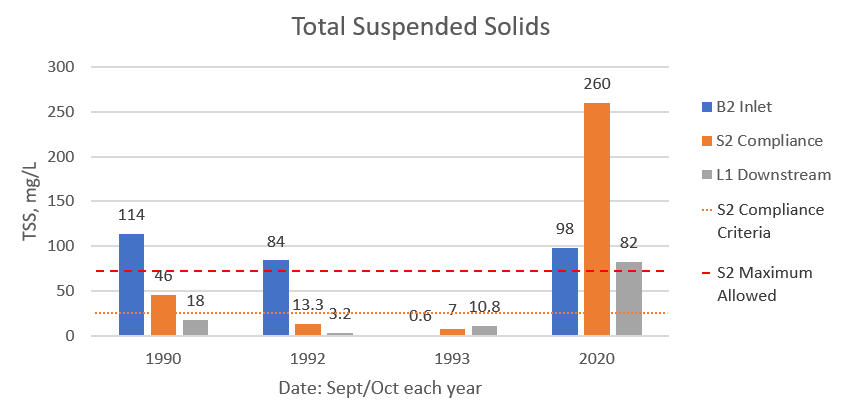Status Updates
|
|
9/2023 - Plaintiff sends letter to HOA Members to explain the facts (versus the HOA's misleading information).
8/2023 - Plaintiff sends memo explaining the current risk to LSHOA members due to their Board's decision to refuse to fix the filtering biology of the Biofilter. Note that with the legal fees (required since the HOA lost the CC&R claim), damages for the CC&R claim alone, plus the costs of the HOA's current (and likely ineffective) plan, the HOA is already looking just under $1 million right now, or $4000/household. That does not include any CWA fines, the nuisance claim damages, nor future mounting attorneys' fees plus interest. 7/2023 - The State Court determined that the LS HOA violated its CC&Rs by failing to maintain the Biofilter! See order. The trial is set for November 2023 to determine what damages the HOA must pay for that violation, and whether the HOA will be paying money for other claims as well. 5/2023 - The new U.S. Supreme Court’s opinion Sackett v. EPA changes which wetlands are protected as "water of the US" under the Clean Water Act (CWA). Now, only wetlands “indistinguishable” from an adjacent “water of the United States” (WOTUS) may be subject to federal jurisdiction. Such wetlands have a “continuous surface connection to another water body that is a WOTUS in its own right, so that there is no clear demarcation between ‘waters’ and ‘wetlands.” This makes it likely that the lack of Biofilter maintenance will no longer be excused since the Biofilter cannot be considered a federally "protected wetland". 12/2022: State Court order denies Defendant's Motion to Dismiss. Defendant HOA must answer the Complaint. 11/2022: Update: Clean Water Act ("CWA") Violation Citizen's Lawsuit
Update for State Court Lawsuit for Violation of the CC&Rs and Nuisance
Questions that every LACAMAS SHORES HOA MEMBER should have Answers to:
1) What does your HOA insurance cover?
Why is this case not already settled? Between the two cases, the Plaintiff is asking the HOA 1) to stop polluting the lake and 2) to reimburse his attorney's fees, which are increasing daily. Is that really not a possibility until after YEARS of fines and legal fees pile up?
|
Note the HOA's report on page 20-21. The latest order is here, denying the HOA's Motion for Summary Judgment for multiple reasons .
The latest court order is here, stating that the HOA cannot use the City's permit to pollute and a protected wetland cannot pollute the Lake. The question then becomes can this stormwater treatment wetland become a protected wetland.
Plaintiff's loss = HOA's loss of control over its own property! Four City Codes might exempt the Biofilter from needing the City's permission for restoration. The City ignored a request for an official interpretation of those codes. That refusal was appealed. The HOA's attorneys argued with the City that the City didn't have to answer a request from anyone other than the HOA. The court agreed and the City still has not applied those codes to the Biofilter. The Plaintiff's loss is the HOA's loss of control over its own property! And yet the HOA has refused to make the same request!
In the News: August 18, 2021 Camas and Lacamas Shores HOA receive notice of citizens intent to sue via federal Clean Water Act August 16, 2021 Camas To Be Sued For Federal Clean Water Act Violations (Explains what the notice is about, how CWA lawsuits work, and what could happen.) August 19, 2021 Ask Leslie: Regarding [Fines in] the Lacamas Lake biofilter case (Explains City vs. HOA liability under the CWA) Guide to Clean Water Act Citizen Suits Let the City hear your voice - make a public comment at a City Council meetingMeeting are the 1st and 3rd Mondays. You will have up to 3 minutes to speak, or you can email a comment to: publiccomments@cityofcamas.us
The LS HOA can be emailed at mmcdowell@iwmhoa.com (property manager) |
11/2021: Mr. Steve Bang has made the difficult decision this week to move forward with his Clean Water Act Citizens suit against the Lacamas Shores Homeowners Association (HOA). The HOA owns and operates a biofilter treatment facility that, while designed to treat stormwater from the residential development before it enters Lacamas Lake, has been so poorly maintained it is not only failing to provide that treatment but is actually adding pollution to the Lake.
The Lacamas Shores Biofilter was artificially created as a condition of approval in the 1988 shoreline permit that authorized development of the Lacamas Shores neighborhood. For the first several years of operation, the Biofilter was properly maintained with low-lying grasses that effectively removed pollutants.
In more recent years, because of the lack of maintenance by the HOA, the Biofilter has fallen into disrepair. The “filter” part of the biofilter—namely, the high-filtering, tightly knit, and easily managed grasses that remove pollution — have been crowded out by tree shadow, which prevents vegetation and contaminant removal. Leaves and dead plants in the Biofilter litter the ground continuously, discharging pollutants into the adjacent, natural wetlands and Lacamas Lake. The HOA has failed to repair the Biofilter, despite being charged with that duty by the development permits and its own governing documents. Instead, the HOA intends to pay consultants to continue to study the Biofilter, for minimally another year, before considering any remediation process.
Multiple years of study have confirmed that this pollution has been taking place, and Steven Bang has been imploring the HOA to fulfill its duty to properly maintain the Biofilter by removing inappropriate vegetation, replanting grasses, and harvesting vegetation. The need for fixing the Biofilter has increased in recent years, as Lacamas Lake has experienced dangerous algal blooms that have threatened public health and required use restrictions at the Lake.
While the City of Camas has also had a role in this ongoing pollution of Lacamas Lake by previously indicating, contrary to the plain language of its own municipal code, that additional permits may be needed to conduct routine Biofilter maintenance activities, the ultimate responsibility to stop this pollution lies with the HOA. The HOA has failed to remove inappropriate vegetation as authorized by the Camas City Code, failed to pursue a determination by the City that additional permits are not required for these activities, and even failed to take the simple step of joining Mr. Bang’s pending request that the City of Camas make such a determination. Given the HOA’s inaction, Mr. Bang was also forced to file an action in Clark County superior court challenging the City’s refusal to process a code interpretation request regarding permitting requirements for maintenance of the Biofilter. That litigation against the City is ongoing.
Mr. Bang regrets that he needed to resort to filing a Clean Water Act citizen suit to address these ongoing violations. There is an easy path to solving this problem—the HOA simply needs to conduct routine maintenance of the Biofilter, as authorized under existing permits. This is a much more effective and cost-efficient solution than unproven alternative proposals that have been suggested, which would cost hundreds of thousands of dollars. Given the HOA’s failure to take such action for years, as the water quality in Lacamas Lake has continued to worsen, Mr. Bang was left with no option but to file a citizen suit to protect the neighborhood’s homeowners as well as the citizens of Camas. Mr. Bang is hopeful that this lawsuit will lead to repairing the Biofilter and turning it back into a facility that removes pollutants from, rather than adding pollutants to, Lacamas Lake.
How does this affect you? Any fines, legal fees and remediation costs will have to be paid by the HOA. Whatever insurance and reserves cannot pay, the individual homeowner will have to split. The City, prohibiting the required maintenance of the biofilter, is currently using tax payers' money on attorneys instructed to defend the City's refusal to address whether City ordinance exempts the needed maintenance from requiring new permits, instead of just answering the question.
The Lacamas Shores Biofilter was artificially created as a condition of approval in the 1988 shoreline permit that authorized development of the Lacamas Shores neighborhood. For the first several years of operation, the Biofilter was properly maintained with low-lying grasses that effectively removed pollutants.
In more recent years, because of the lack of maintenance by the HOA, the Biofilter has fallen into disrepair. The “filter” part of the biofilter—namely, the high-filtering, tightly knit, and easily managed grasses that remove pollution — have been crowded out by tree shadow, which prevents vegetation and contaminant removal. Leaves and dead plants in the Biofilter litter the ground continuously, discharging pollutants into the adjacent, natural wetlands and Lacamas Lake. The HOA has failed to repair the Biofilter, despite being charged with that duty by the development permits and its own governing documents. Instead, the HOA intends to pay consultants to continue to study the Biofilter, for minimally another year, before considering any remediation process.
Multiple years of study have confirmed that this pollution has been taking place, and Steven Bang has been imploring the HOA to fulfill its duty to properly maintain the Biofilter by removing inappropriate vegetation, replanting grasses, and harvesting vegetation. The need for fixing the Biofilter has increased in recent years, as Lacamas Lake has experienced dangerous algal blooms that have threatened public health and required use restrictions at the Lake.
While the City of Camas has also had a role in this ongoing pollution of Lacamas Lake by previously indicating, contrary to the plain language of its own municipal code, that additional permits may be needed to conduct routine Biofilter maintenance activities, the ultimate responsibility to stop this pollution lies with the HOA. The HOA has failed to remove inappropriate vegetation as authorized by the Camas City Code, failed to pursue a determination by the City that additional permits are not required for these activities, and even failed to take the simple step of joining Mr. Bang’s pending request that the City of Camas make such a determination. Given the HOA’s inaction, Mr. Bang was also forced to file an action in Clark County superior court challenging the City’s refusal to process a code interpretation request regarding permitting requirements for maintenance of the Biofilter. That litigation against the City is ongoing.
Mr. Bang regrets that he needed to resort to filing a Clean Water Act citizen suit to address these ongoing violations. There is an easy path to solving this problem—the HOA simply needs to conduct routine maintenance of the Biofilter, as authorized under existing permits. This is a much more effective and cost-efficient solution than unproven alternative proposals that have been suggested, which would cost hundreds of thousands of dollars. Given the HOA’s failure to take such action for years, as the water quality in Lacamas Lake has continued to worsen, Mr. Bang was left with no option but to file a citizen suit to protect the neighborhood’s homeowners as well as the citizens of Camas. Mr. Bang is hopeful that this lawsuit will lead to repairing the Biofilter and turning it back into a facility that removes pollutants from, rather than adding pollutants to, Lacamas Lake.
How does this affect you? Any fines, legal fees and remediation costs will have to be paid by the HOA. Whatever insurance and reserves cannot pay, the individual homeowner will have to split. The City, prohibiting the required maintenance of the biofilter, is currently using tax payers' money on attorneys instructed to defend the City's refusal to address whether City ordinance exempts the needed maintenance from requiring new permits, instead of just answering the question.


